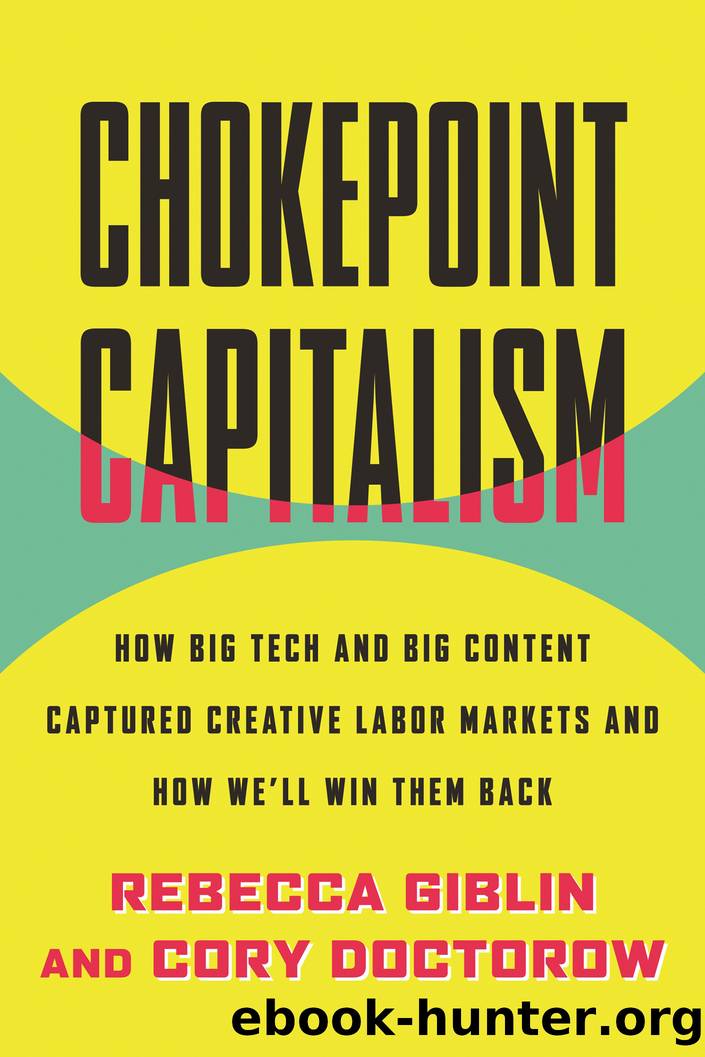Chokepoint Capitalism by Rebecca Giblin & Cory Doctorow

Author:Rebecca Giblin & Cory Doctorow [Giblin, Rebecca & Doctorow, Cory]
Language: eng
Format: epub
Publisher: Cordoc-Co LLC
Published: 2022-12-15T00:00:00+00:00
CHAPTER 14
COLLECTIVE ACTION
In 2020 and 2021, some sixty thousand drivers, fifteen thousand couriers, and five thousand riders began arbitration against Uber, Postmates, and DoorDash. Arbitration is a kind of private court, but with arbitrators making decisions instead of judges. There are other differences too: the process and outcomes are hidden from public scrutiny, and there are usually caps on the amount that can be recovered and no right of appeal. Unlike a court, an arbitration doesnât produce a precedent, so you canât leverage the victory of someone like you who has already achieved a successful verdict. Two people with identical cases might get different outcomes, and since the whole thing is secret, they probably wonât even find out.
Workers use it because they have no choice: a growing number of companies compel their workforces to give up the right to have disputes heard in court as a condition of doing business. Usually, this works out well for big business. Jurisdictions like California require them to pay the costs, which can be around $60,000 per arbitration, but itâs proven that arbitrators tend to find in favor of the powerful corporations that pay their invoices.1 The fact that outcomes are so unfavorable to workers keeps the number of claims low.
But these drivers, couriers, and riders flipped the script. Realizing how their companies had trapped them, they organized to spring the trap in the other direction with a coordinated deluge of claims. At $60,000 apiece, DoorDashâs liability in arbitration fees alone would be $300 millionâprobably far more than they would have had to pay in any class action lawsuit. All three companies found themselves scrambling to get out of this disaster of their own making, ironically begging courts to rule that their workersâ mass arbitration claims should not be allowed. Uber ended up settling with most of its drivers for at least $146 million. Postmates and DoorDash were ordered to go ahead with thousands of individual arbitrations they canât afford, putting their vulnerable, low-paid workers in a sudden position of power.
This jujitsu from some of Americaâs most disempowered workers inspired us to think about how creative workers might themselves take better advantage of their collective power to claim a greater share of the value they produce. If we think of collective action as a theory of change, what are the most promising levers that can be pulled, and to which fulcrums should they be applied?
One huge advantage of authors, musicians, screenwriters, and artists is that they are highly visibleâcollectively, and (the most famous of them at least) individually too. When they speak, the media reports. Starstruck members of Congress pay attention. Dedicated fans amplify their messages. Stock prices tremble. Change can be madeâas when recording artists worked together to roll back a change the recording industry had snuck into law to steal away their rights. (Keep readingâwe dig into that incredible story in the chapter that comes next!)
But while top creators use their political and media platforms to support any number of important causes
Download
This site does not store any files on its server. We only index and link to content provided by other sites. Please contact the content providers to delete copyright contents if any and email us, we'll remove relevant links or contents immediately.
Zero to IPO: Over $1 Trillion of Actionable Advice from the World's Most Successful Entrepreneurs by Frederic Kerrest(4568)
Machine Learning at Scale with H2O by Gregory Keys | David Whiting(4313)
Never by Ken Follett(3955)
Harry Potter and the Goblet Of Fire by J.K. Rowling(3857)
Ogilvy on Advertising by David Ogilvy(3622)
Shadow of Night by Deborah Harkness(3368)
The Man Who Died Twice by Richard Osman(3078)
Book of Life by Deborah Harkness(2939)
The Tipping Point by Malcolm Gladwell(2921)
Will by Will Smith(2919)
Purple Hibiscus by Chimamanda Ngozi Adichie(2853)
0041152001443424520 .pdf by Unknown(2845)
My Brilliant Friend by Elena Ferrante(2831)
How Proust Can Change Your Life by Alain De Botton(2814)
How to Pay Zero Taxes, 2018 by Jeff A. Schnepper(2655)
Hooked: A Dark, Contemporary Romance (Never After Series) by Emily McIntire(2553)
Rationality by Steven Pinker(2363)
Can't Hurt Me: Master Your Mind and Defy the Odds - Clean Edition by David Goggins(2341)
Borders by unknow(2313)
